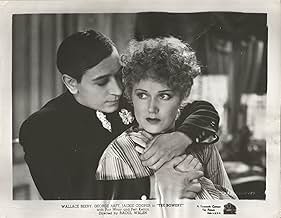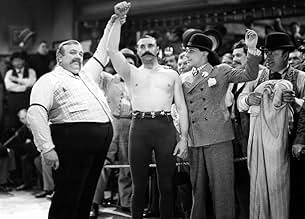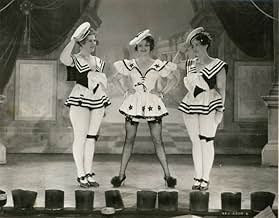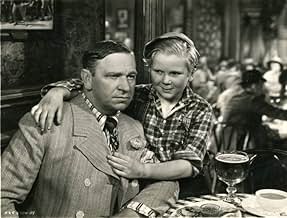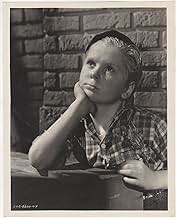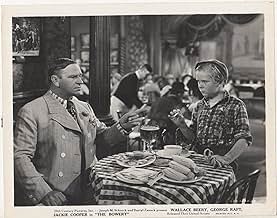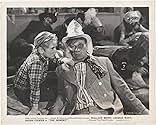Ajouter une intrigue dans votre langueIn New York's Bowery during the Gay Nineties, a saloon owner and a rebel share a rivalry.In New York's Bowery during the Gay Nineties, a saloon owner and a rebel share a rivalry.In New York's Bowery during the Gay Nineties, a saloon owner and a rebel share a rivalry.
- Réalisation
- Scénario
- Casting principal
- Récompenses
- 3 victoires au total
Bull Anderson
- Pug
- (non crédité)
Irving Bacon
- Hick
- (non crédité)
Lucille Ball
- Blonde
- (non crédité)
John Bleifer
- Mumbo the Mute
- (non crédité)
Phil Bloom
- Pug
- (non crédité)
James Burke
- Recruiting Sergeant
- (non crédité)
Marguerite Caverley
- Undetermined Secondary Role
- (non crédité)
Avis à la une
Culled from the real life exploits of Chuck Connors and Steve Brodie in 1890s New York, "The Bowery" is high energy and good natured.
But be warned: Casual racial epithets flow off the tongues of Wallace Beery and little Jackie Cooper. The very first shot might be startling. This is true to the time it was set and the time it was made. And it also speaks to the diversity of population in that neck of the woods. It certainly adds to the gritty flavor of the atmosphere.
Beery as Connors is the blustering thunder at the center of the action, a loud-mouth saloon keeper with his own fire brigade. And he has a soft spot for ornery orphan Cooper. Raft as Brodie is Connors' slicker, better looking rival in almost every endeavor. Brodie could never turn down a dare and loved attention, leading up to a jump off the Brooklyn Bridge (it is still debated whether he actually jumped or used a dummy).
Beery is as bombastic as ever with a put-on Irish-American accent. He is just the gruff sort of character to draw children, cats and ladies in distress. This is possibly the most boisterous character Raft ever played, and he even gets to throw in a little dancing (as well as a show of leg). And again he mistakes the leading lady (lovely Fay Wray) for a prostitute. Cooper is as tough as either of them, though he gets a chance to turn on the tears.
The highlight isn't the jump off the bridge but a no-holds-barred fistfight between Connors and Brodie that in closeup looks like a real brawl between the principals. It's sure someone bruised more than an ego.
But be warned: Casual racial epithets flow off the tongues of Wallace Beery and little Jackie Cooper. The very first shot might be startling. This is true to the time it was set and the time it was made. And it also speaks to the diversity of population in that neck of the woods. It certainly adds to the gritty flavor of the atmosphere.
Beery as Connors is the blustering thunder at the center of the action, a loud-mouth saloon keeper with his own fire brigade. And he has a soft spot for ornery orphan Cooper. Raft as Brodie is Connors' slicker, better looking rival in almost every endeavor. Brodie could never turn down a dare and loved attention, leading up to a jump off the Brooklyn Bridge (it is still debated whether he actually jumped or used a dummy).
Beery is as bombastic as ever with a put-on Irish-American accent. He is just the gruff sort of character to draw children, cats and ladies in distress. This is possibly the most boisterous character Raft ever played, and he even gets to throw in a little dancing (as well as a show of leg). And again he mistakes the leading lady (lovely Fay Wray) for a prostitute. Cooper is as tough as either of them, though he gets a chance to turn on the tears.
The highlight isn't the jump off the bridge but a no-holds-barred fistfight between Connors and Brodie that in closeup looks like a real brawl between the principals. It's sure someone bruised more than an ego.
Such are the title-song lyrics to this 1933 frolic, directed by Raoul Walsh to be modest in story but long on atmosphere. Made at 20th, it has something of an MGM cast: Wallace Beery and Jackie Cooper had been such a hit in "The Champ" two years earlier, the studio must have been anxious to reteam them. Cooper was a good little actor, but here, as.an unsympathetic little ruffian in the Lower East Side of the Gay '90s, he's just marking time, and Beery, whom practically everybody who ever worked with him appears to have loathed, tries and fails to be a charmer. The story's that of Steve Brodie and his alleged jump off the Brooklyn Bridge (it was also the basis for "Kelly," a one-night 1965 musical that was, up till then, the biggest money-loser in Broadway history); it's not much of a story, but it does allow for some lively set pieces, and George Raft, as Brodie, has a part that suits him well. There's also Fay Wray, who's warm and appealing, and Pert Kelton, expertly knocking out one of the sassy broads she did so well back then. Marred by phony-looking process shots and plot implausibilities and non-clear things (I'm still not sure, did they throw a dummy off the bridge or not?), and off-the-charts non-PC by today's standards, it's nevertheless rollicking, and you can be sure that under Walsh's watch you'll get hard-hitting fights, atmosphere galore, rude insult humor, and a setting where, like the song goes, they do strange things.
I love this freekin movie! Walsh is a true master of the cinematic form, his film have been sometimes in my opinion, overlooked. But this film is a favourite of mine because it really gives you the feel of the time the film was set in.\
All the wonderful characters that existed, the lifestyle, the mode of dress, the way they spoke, OK they might be exaggerated, but it is good to know that there were occasion when two men tried to outdo each other with insane stunts.
I just felt it was apiece of history thats should be wathced by many people and appreciated because of that fact.
Can I get it somewhere on DVD? I have only seen it on TV. But for anyone wanting a slice of life movie about that period of time this is the perfect one.
All the wonderful characters that existed, the lifestyle, the mode of dress, the way they spoke, OK they might be exaggerated, but it is good to know that there were occasion when two men tried to outdo each other with insane stunts.
I just felt it was apiece of history thats should be wathced by many people and appreciated because of that fact.
Can I get it somewhere on DVD? I have only seen it on TV. But for anyone wanting a slice of life movie about that period of time this is the perfect one.
High energy Raoul Walsh classic from 1933, The Bowery places saloon owner and operator Wallace Beery against bitter rival and dandy, George Raft, with adopted street kid Jackie Cooper and good looking Faye Wray in roles that play in between their big rivalry. It's not clear exactly what the rivalry is all about, but everyone follows it in the daily tabloids. Plenty of wisecracks at the beginning, but the characters soften up as the film progresses. Apart from that is the sheer exuberance of the scenes in Beery's saloon. The various characters, sexy chorus line, lots of drinking, a perfect creation of a den of iniquity not too refrained by so-called pre-code restrictions, and then later come the Carrie Nations led by Carrie Nation herself. It all creates a very vivid picture of a life that's long gone. I don't like to compare eras, but this film is completely and totally different from anything one would see today. The film has plenty of heart and long lost innocence and is absolutlely a must see.
In Brooklyn a century ago, the rivalry between Chuck Connors and Steve Brodie and their competing volunteer fire brigades leads to Brodie's famous bet that he can jump off the Brooklyn Bridge. This is a story which will be familiar to a lot of people through a Bugs Bunny spoof, "Bowery Bugs" from 1949.
This generally very enjoyable film would probably be more widely available if it were not for the notorious and unsettling scene involving some Chinese tenement dwellers -- a time capsule of antediluvian racial attitudes, giving the film a great deal of historical interest, in my view.
This generally very enjoyable film would probably be more widely available if it were not for the notorious and unsettling scene involving some Chinese tenement dwellers -- a time capsule of antediluvian racial attitudes, giving the film a great deal of historical interest, in my view.
Le saviez-vous
- AnecdotesGeorge Raft and Wallace Beery were at odds during filming. According to Raft, before the fistfight scene, Beery asked Raft to let him throw the first punch and then proceeded to sucker-punch Raft, knocking him out for several minutes. "When I came to I got up and called him everything I could think of," Raft said. They then fought for real, and the crew had to break it up.
- GaffesThe name of George Raft's character, "Steve Brodie," is misspelled "Brody" in the opening credits.
- Citations
Steve Brodie: Don't ever say I never give ya nothin'.
- Versions alternativesThe version shown on Fox Movie Channel runs seven seconds over 87 minutes. Apparently it is a reissue copy, the missing five minutes due to reediting to fit post code rules. Though it was made for Twentieth Century Films, a new start up film studio organized by Joe Schenck, Bill Goetz (L.B. Mayer's son-in-law) and ex-Warner Bros. production chief Darryl Zanuck, the FMC version is presented under the post merger logo of Twentieth Century Fox complete with fanfare and an end title crediting distribution to TCF. This year a full uncut version was shown at New York's Film Forum which clocked several minutes over ninety minutes.
- ConnexionsEdited into Brooklyn Bridge (1981)
- Bandes originalesThe Bowery
(uncredited)
Music by Percy Gaunt
Lyrics by Charles Hale Hoyt
Sung by a chorus at the beginning
Played often in the score
Meilleurs choix
Connectez-vous pour évaluer et suivre la liste de favoris afin de recevoir des recommandations personnalisées
- How long is The Bowery?Alimenté par Alexa
Détails
Box-office
- Budget
- 421 496 $US (estimé)
- Durée
- 1h 32min(92 min)
- Couleur
- Rapport de forme
- 1.37 : 1
Contribuer à cette page
Suggérer une modification ou ajouter du contenu manquant

